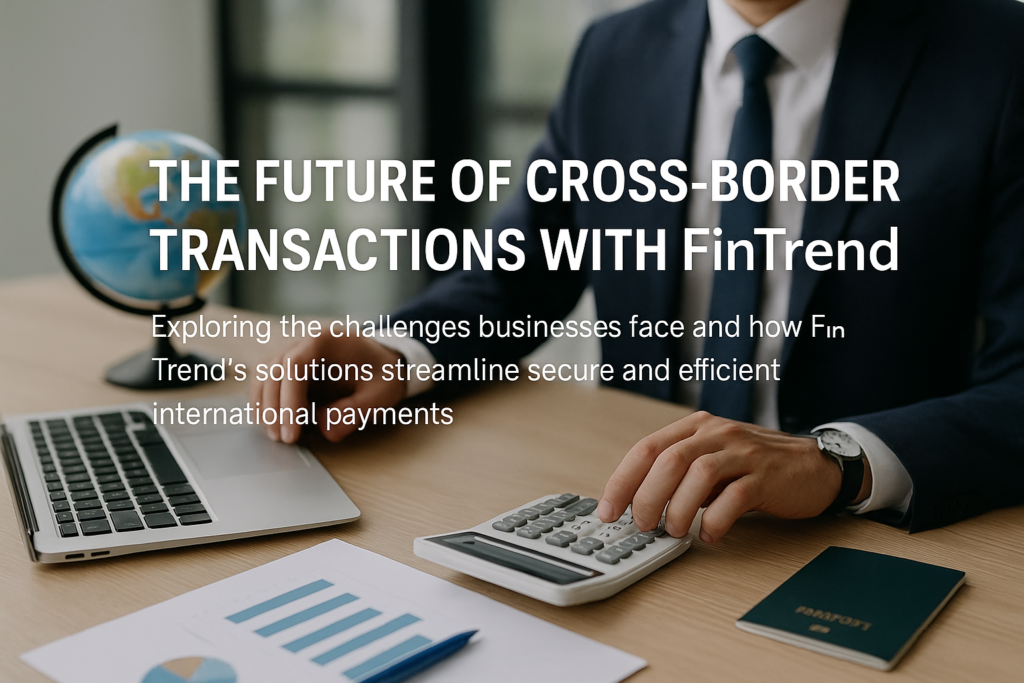Posted : 11/08/2025
5 minute read
The Future of Cross-Border Transactions with FinTrend

“The Future of Cross‑Border Transactions with FinTrend” — exploring the challenges businesses face and how FinTrend’s solutions streamline secure and efficient international payments.
1. The Complex Landscape of Cross‑Border Payments
Cross‑border transactions underpin global trade and commerce, but are often mired in complexity:
- High costs
Businesses face steep FX markups, transaction fees, and poorer exchange rates, particularly with less liquid currencies, eroding margins.FinTrend - Slow settlement times
Payments routed through multiple correspondent banks suffer delays—sometimes days—due to time zones, holidays, and sequential processing.FinHub: Your Centralized Payment Solution - Limited access
Not all banks have correspondent relationships in every market. Some regions remain underserved or disconnected, limiting payment reach. - Lack of transparency
Many providers offer little real-time visibility, making it difficult for businesses to track funds or anticipate delivery, hurting forecasting and trust. - Regulatory and compliance hurdles
Each jurisdiction imposes its own layers of KYC, AML, sanctions checks and reporting requirements—creating a heavy burden, especially for high-growth businesses. - Geopolitical and infrastructure shifts
Emerging alternatives like CBDC-led mBridge, tokenized rails, and regional systems signal disruption to SWIFT’s correspondent model—but adoption remains nascent and fragmented.
2. FinTrend’s Edge: Enabling Efficient & Secure Global Payments
FinTrend effectively addresses the above challenges through its integrated payment ecosystem:
FinHub: Centralized, Real-Time Orchestration
FinHub is a cloud-native, API-powered payment orchestration platform that consolidates operations across banks, wallets, card networks, and fintech partners—across domestic and cross‑border flows.Finhub Your Centralized Payment Solution
- Real-time monitoring gives users full visibility—from initiation through settlement.
- Payment routing intelligence optimizes paths for speed and cost, avoiding traditional correspondent chain inefficiencies.
Automated, Transparent Workflow
FinTrend automates critical processes like invoicing, reconciliation, and disbursements—while ensuring compliance workflows remain embedded and seamless. FinTrend
- Transparency: Every transaction is tracked, reducing “black‑box” uncertainty and improving forecasting and trust.
- Efficiency: Automation cuts manual effort and errors, enabling faster, scalable operations.
Instant Beneficiary Validation
FinHub offers real-time validation of recipient details for both domestic and international transfers—reducing failed payments and fraud risk.Finhub
3. Why FinTrend Stands Out
Challenge | FinTrend’s Solution | Benefit |
High costs & poor FX | Smarter routing, API-driven FX options | Lower fees, improved margins |
Slow, opaque transfers | Orchestrated paths + real-time dashboards | Faster settlements, better visibility |
Limited network access | Broad payment partner integrations | Broader reach, coverage across corridors |
Compliance complexity | Embedded KYC/AML screening + validation | Risk mitigation, streamlined compliance |
Manual processing | Automated workflows and reconciliation | Time-saving, accuracy, operational scale |
4. Looking Ahead: Transforming Global Payments
The global cross-border payment market is forecasted to grow roughly 9% annually, projected to reach a staggering $290 trillion by 2030—calling for innovation that matches scale. FinTrend’s model—central orchestration, automation, real-time validation, and deep integrations—positions it as a future-ready partner, ready to navigate evolving infrastructure (e.g., CBDCs, tokenization) while delivering for today’s global enterprises.

5. Wrap-Up & CTA
In Summary: Cross-border payments are inherently complex—but FinTrend simplifies them through centralized orchestration (FinHub), automation, real-time visibility, and robust compliance support. This delivers cost-efficiency, speed, broader access, and reliability.